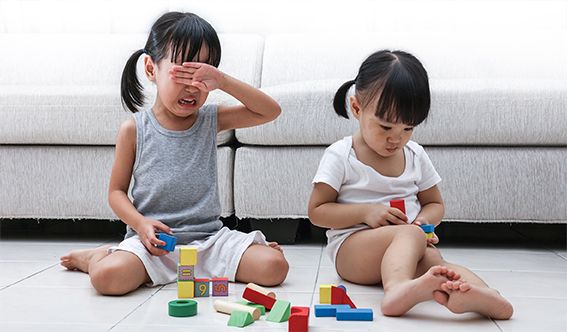What should parents do when their kids won’t stop fighting?
Karen Holford is our resident family therapist and she has a few other tips up her sleeve:
- It’s definitely wise to let them sort out their own disagreements. But they are still quite young and may need some help to do this, especially your two-year-old, who is more likely to be emotional than rational.
- Wait a few minutes and see if they settle down by themselves. Decide for yourself how long you will let them disagree before intervening, depending on their age. Set ground rules to keep them safe, such as not hurting or touching each other when they are cross.
- If one or both of them are becoming emotional, validate their feelings first and show that you understand: “It can be sad when you want to play with a toy that someone else is holding”, “When someone else is playing with your toys, you might be afraid that they will break them or not give them back”. This can help them to name their own emotions and show empathy to others.
- Remind them of the positive social or play skills they used during happier times. “Do you remember yesterday when your little sister took your toy? You let her have it and, a few minutes later, she began playing with something else and you were able to have it back. Perhaps we can try that again today?”
- Stay calm, neutral, non-blaming and non-shaming. Be a good role model of the behaviour you want to see in them. Avoid yelling or taking something away from them by force, because you’ll be teaching them behaviour that you don’t want them to copy.
- Give them the same choice. “Shall we put these toys away now because they are making you both sad? Or shall we sit here and read a story till we both feel better?”
- Offer some options they could use to help them solve their disagreements in the future. “I wonder what you could do when playing together is making you both sad or cross? You could choose to play with another toy for a while. You could take turns playing with the toy you both want and I can set a timer for you. You could come and help me make dinner. You could go outside and play in the garden for a while. What else could you do?”
- If they both want the same toy, you could suggest, “Would you like to help make Tommy happy by letting him play with the red car for a while?” This can be easier for a young child to understand than “Give the toy to your brother!,” which sounds like they’ll never get it back! It also helps them to understand that peaceful playing helps others to feel happy.
- Finally, try to spot a pattern in the times when they are more likely to disagree to help you set up different kinds of play at those vulnerable times, so that they are less likely to upset each other. Are they more likely to be hungry or tired? Do they need some calming time or one-to-one time with you?
Psychologist Collett Smart gives us the low-down. Fret not, she doesn’t stop there. Watch the video through to find out her top tips to actually get them to stop fighting!
When children play together and have their little fights and conflicts, behaving like lion cubs, they are actually learning and practising valuable skills that will be vital in the real world, where they will face larger conflicts. Support them in their own peacemaking experiments as they grow older and encourage them to find creative solutions together.
Model good conflict resolution skills in your home. Let your children see adult family members talking through some safe issues, listening to each other, showing understanding, being flexible and searching for collaborative solutions.
Being able to resolve conflicts peacefully will help them to have better friendships and happier relationships in the future.
Mums At The Table
Related posts
Subscribe
Receive personalised articles from experts and wellness inspiration weekly!

